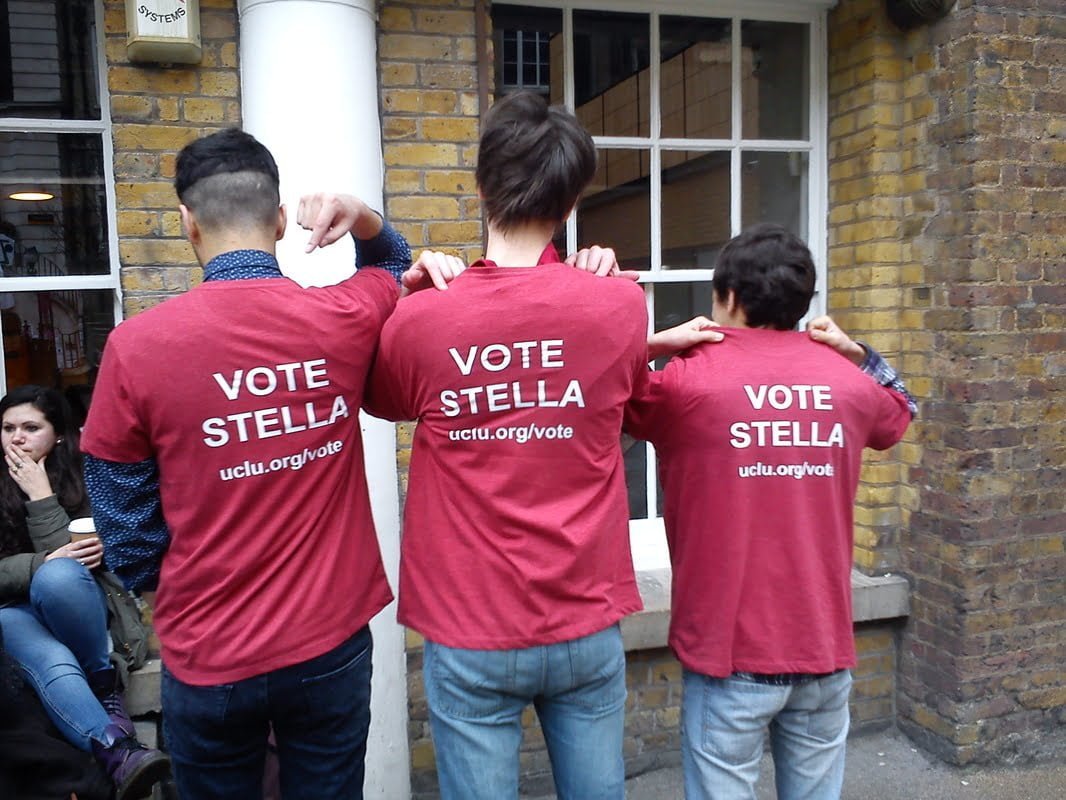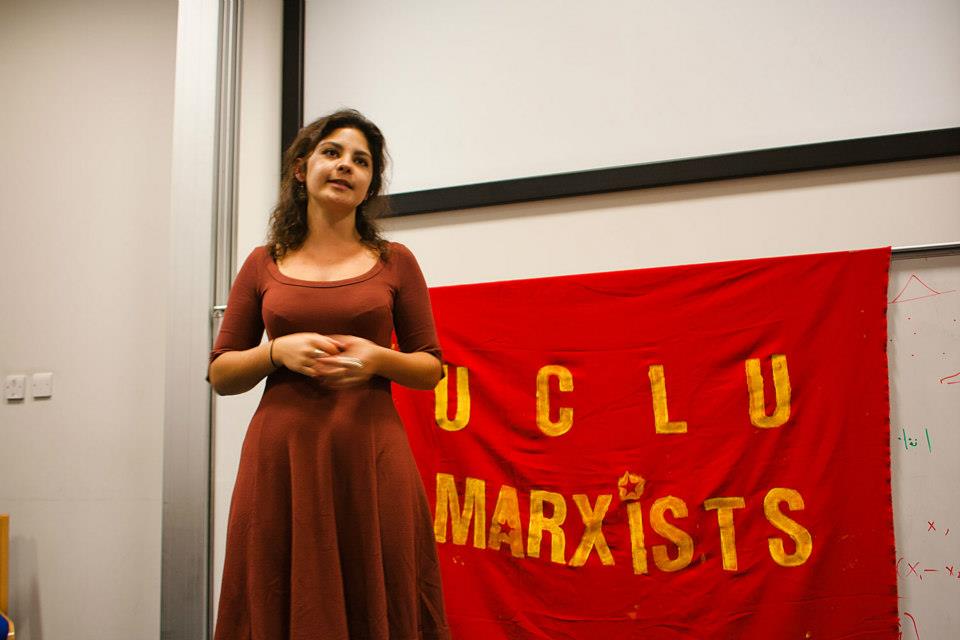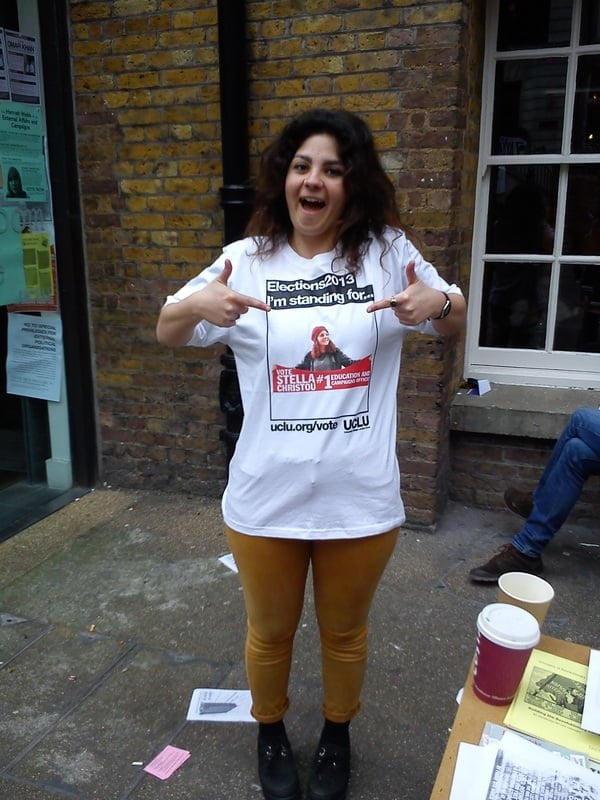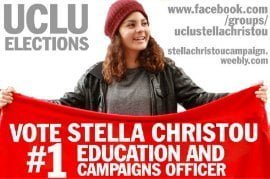University College London Union, like many other student unions, held elections this spring for full-time and part-time positions representing the student body. Stella Christou, a member of Socialist Appeal and founder of the UCLU Marxist Society, ran for the full-time position of Education & Campaigns Officer, campaigning on an openly Marxist platform: to unite students and workers in the fight for socialism.
University College London Union, like many other student unions, held elections this spring for full-time and part-time positions representing the student body. These elections can be considered a success, as most of the full-time officer positions are now occupied by candidates on the left of the political spectrum.
Stella Christou, a member of Socialist Appeal and a UCL student, ran for the full-time position of Education & Campaigns Officer – one that is known for its political reach, with incumbents in previous years taking an active leading role in the student movement. Stella, who is also the founder of the UCLU Marxist Society, campaigned on an openly Marxist platform: to unite students and workers in the fight for socialism.
Not bowing to reformism, the campaign was bold in declaring that the continuing attacks on education are a result of the organic crisis of the capitalist system; it outlined the need to abolish all student fees and living debt, for universities to provide universal accommodation for students subsided by the state and to drive big business out of education. All of this, Stella emphasized, could be achieved only by taking the NUS forward “in alliance with the wider labour movement”.
 Stella on the radio, debating the Tory Society PresidentIn a radio debate with UCLU Tory Society President, students heard from Stella that a fight against all student fees is the only option in any campaign of the student movement. If we allow tuition fees to remain as they are, we must allow for their further increase as the capitalist crisis – deepens something which most already debt-laden student cannot accommodate. Besides, by accepting fees and maintenance loans as a compromise in student living we forgot why fees were increased and loans were slashed in the first place. When asked how she planned to abolish all fees, Stella explained that it is not the task of one person or even one student union; it is for a wide-scale national mobilisation of students united with workers to achieve. Stella’s role would be to engage the majority of UCL students in the struggle, to the extent that even the NUS leadership would be pressured into radical action.
Stella on the radio, debating the Tory Society PresidentIn a radio debate with UCLU Tory Society President, students heard from Stella that a fight against all student fees is the only option in any campaign of the student movement. If we allow tuition fees to remain as they are, we must allow for their further increase as the capitalist crisis – deepens something which most already debt-laden student cannot accommodate. Besides, by accepting fees and maintenance loans as a compromise in student living we forgot why fees were increased and loans were slashed in the first place. When asked how she planned to abolish all fees, Stella explained that it is not the task of one person or even one student union; it is for a wide-scale national mobilisation of students united with workers to achieve. Stella’s role would be to engage the majority of UCL students in the struggle, to the extent that even the NUS leadership would be pressured into radical action.
Since tuition fees have increased, the menacing presence of big business in education has become increasingly apparent at UCL. This came to a head late last year when the university revealed plans to open a campus in Stratford, East London which would cause the eviction of 800 local residents in favour of post-graduate and profiteering research centres. The so-called Bloomsbury Masterplan soon followed, a £500 million overhaul of UCL’s main campus which would involve the demolition of the campus medical practice and the replacement of department space with a “social hub”, including a Starbucks. At the same time, academic funding is still decreasing, departments will be merged, lecturer layoffs will continue and post-graduate teaching assistants and menial workers will have to go on living below the London living wage.
Stella was the only candidate in the UCLU elections to link the emergence of big business at UCL and simultaneous cuts to education with the crisis of capitalism. At the candidate hustings held on campus, she told the audience that the crisis will only deepen; that just as it affects other areas of the economy, education must also suffer. The only alternative is to fight for socialist policies in a mass campaign allying the struggle of students with the struggle of others suffering from the crisis in Britain – working people. These include UCL lecturers whose jobs and salaries are threatened by education cuts and UCL staff on extremely low wages. Stella stressed the importance of large-scale student campaigns which stand in solidarity with lecturers and staff as a clear enactment of student-worker unity in the overthrow of Capitalism.
 Stella’s campaign teamMoreover, Stella saw her role as Education and Campaigns Officer as stretching beyond simply the bounds of the main campuses and lecture theatres of UCL. She showed the close relation between London rent prices and a student’s education suffering: “Extortionate rents force students to take part-time work, compromising their studies.” While expanding university-owned accommodation to be available to all students would go some way to solving this problem, the price of the accommodation would need to be capped at running-cost to allow all students the freedom to study properly. Stella advocated a campaign for UCL (and the University of London, which owns intercollegiate halls in the city) to “open the books” on its halls, to ensure that the university be pressured into capping rent prices at running-costs.
Stella’s campaign teamMoreover, Stella saw her role as Education and Campaigns Officer as stretching beyond simply the bounds of the main campuses and lecture theatres of UCL. She showed the close relation between London rent prices and a student’s education suffering: “Extortionate rents force students to take part-time work, compromising their studies.” While expanding university-owned accommodation to be available to all students would go some way to solving this problem, the price of the accommodation would need to be capped at running-cost to allow all students the freedom to study properly. Stella advocated a campaign for UCL (and the University of London, which owns intercollegiate halls in the city) to “open the books” on its halls, to ensure that the university be pressured into capping rent prices at running-costs.
Ultimately, like other aspects of student life, housing is increasing in price and lowering in standards as funding for universities is cut and profit-making entities wield a greater financial influence in higher education. The planned private redevelopment of the University of London’s Garden Halls is just one of many examples to come of private enterprise infiltrating student accommodation. Stella’s campaign recognised that any campaign for public, university-backed housing for students must involve mass mobilisation right up to NUS level, in tandem with a movement for better public housing in London and Britain generally. She proposed a full-time Accommodation Officer position to be voted on at the next UCL referendum, which would strengthen UCLU’s position in the housing campaign and encourage widespread student engagement on the issue.
Despite not achieving full electoral victory, Stella’s campaign has made a profound political and agitational impact, addressing a wide layer of the student body through the means of various media. Public hustings in the beginning of the campaign allowed the candidates to answer the questions of the audience and to show where they stood on the political spectrum. Of the six candidates running for the position of Education & Campaigns Officer, Stella has put forward the most genuinely militant stance towards the issues brought up by the student audience.
Along with UCL student radio station Rare.fm giving Stella extensive coverage, interviewing her about the ideas of Marxism and her campaign, further publicity had been achieved through the extensive use of social media, particularly a blog and a Facebook group which were used to host and spread some of the campaign material, especially the articles that have been produced throughout the campaign.
 The generally responsive and sympathetic student populace was open to personal engagement, with individual conversations having played an important role in reaching out to a wider audience. Running parallel with an all-out “offensive” by the UCLU Marxist Society, which had been setting up stalls every day and leafleting extensively for its meetings during this highly politicised period of elections, all these measures amount to a great and much-needed effort of spreading the ideas of Marxism throughout the student body and making the Marxist forces very visible around campus and in student politics.
The generally responsive and sympathetic student populace was open to personal engagement, with individual conversations having played an important role in reaching out to a wider audience. Running parallel with an all-out “offensive” by the UCLU Marxist Society, which had been setting up stalls every day and leafleting extensively for its meetings during this highly politicised period of elections, all these measures amount to a great and much-needed effort of spreading the ideas of Marxism throughout the student body and making the Marxist forces very visible around campus and in student politics.
The UCLU election outcomes allow us to draw several important conclusions. The record high voter turnout of 16.3% of the electorate, or 4,261 voters, shows the increasing awareness of the relevance of student politics, as well as the increasing hopes that students, most of whom have cast their votes for the Left, put into their student union to fight against cuts in education and the plans of privatisation in their university.
The fact that Stella, standing as an openly Marxist candidate, made it to the 5th round with over 300 votes, around 20% of the 1500+ valid votes cast for the position, reflects the ever-increasing radicalisation of students, who are beginning to see the crisis of the capitalist system as the root of the problems faced by those in higher education today, and socialism as the solution.
The demand for Marxist ideas is growing, and growing extremely rapidly. The UCLU Marxist Society was only set up in the beginning of this academic year; since then, the Marxist tendency has made outstanding progress on the UCL campus and can now claim to have, at the very least, confidently established a bridgehead in the political life of the UCL student union.
 The aforementioned successes of Stella’s overtly Marxist campaign during the UCLU elections proved that Marxism, given the right platform, can penetrate the breadth of the student populus. This is in equal part due to the growing need for a Marxist theory base in wider society and to the high level of political education that Stella and her campaign team have attained. Emulated on a stronger platform, as we have seen in instances such as the Quebecois student movement in 2012, future campaigns could truly demonstrate the potential for a Socialist transformation of society.
The aforementioned successes of Stella’s overtly Marxist campaign during the UCLU elections proved that Marxism, given the right platform, can penetrate the breadth of the student populus. This is in equal part due to the growing need for a Marxist theory base in wider society and to the high level of political education that Stella and her campaign team have attained. Emulated on a stronger platform, as we have seen in instances such as the Quebecois student movement in 2012, future campaigns could truly demonstrate the potential for a Socialist transformation of society.






